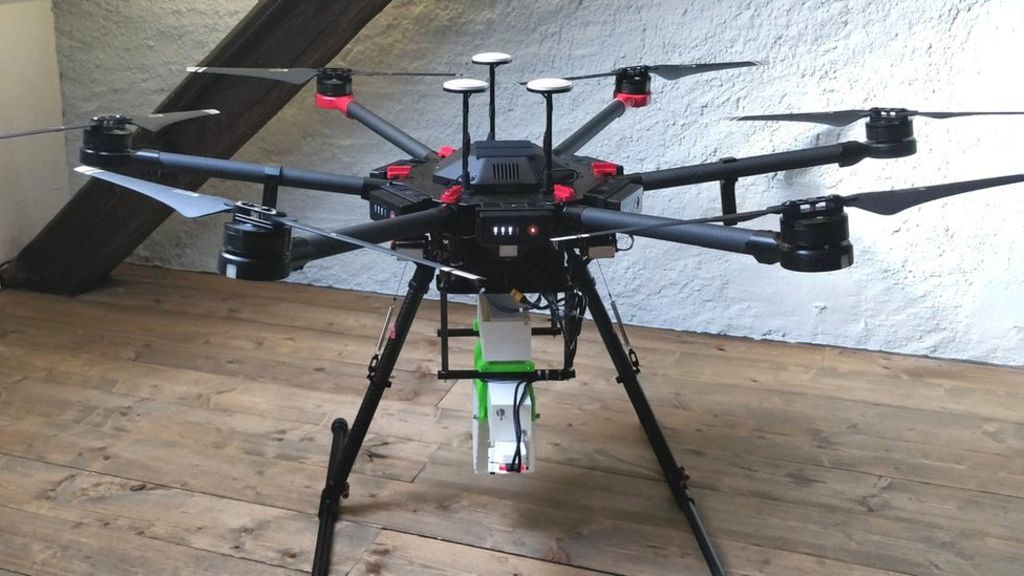Mosquito-spreading Drone To Fight Diseases

 Image copyright
WeRobotics
Image copyright
WeRobotics
Drones that scatter swarms of sterile mosquitoes over wide areas are being developed to help stop the spread of diseases such as malaria.
Sterile male mosquitoes cannot produce offspring when they mate with females. By crowding out other males, they reduce the mosquito population.
But spreading them is difficult in areas without roads, so technology organisation WeRobotics has been developing drones to do the job.
It will trial the idea in 2018.
"Mosquitoes carry many diseases such as malaria, dengue fever and Zika virus. It makes them one of the biggest animal killers worldwide," Adam Klaptocz, WeRobotics co-founder, told the BBC.
"There are lots of methods to control mosquito populations - fumigation, insecticide - but they all have downsides. Insecticide is not good for environment and needs to be constantly deployed."
Releasing sterile insects had been an effective method of population control for a variety of species, he said.
Often the sterile insects are released from backpacks carried by the scientists, but it is difficult to spread them over a wide area - and they cannot simply be dumped in one location.
WeRobotics was approached by international aid organisations to help produce a solution.
"A lot of the places where these diseases exist are also places where roads do not exist. The drones could spread the mosquitoes where there are no roads," said Mr Klaptocz.
But one of the challenges is packing hundreds of thousands of fragile mosquitoes into a payload without damaging their thin legs and wings.
"A mosquito that comes out of a drone damaged - or dead - is not going to mate with females," said Mr Klaptocz.
To protect the insects, they are first cooled to 4-8C, putting them into a sleep-like state that stops them moving around.
The next challenge is releasing the insects gradually over a wide area, without waking the whole lot up at once.
To do so, the team has designed a rotating platform with holes in, through which individual mosquitoes fall. They land in a holding chamber where they wake up, and can fly out into the wild.
"Community engagement is also a key part of the release campaign," Mr Klaptocz told the BBC.
"We may be spreading mosquitoes in areas where they are seen as a vector of death. We need to speak to the local population before a single mosquito is released."
The drones are still in development, but the non-profit company hopes to trial its technology in Latin America in 2018.
Mr Klaptocz hopes to focus on areas at risk from Zika virus first.
From Chip War To Cloud War: The Next Frontier In Global Tech Competition
The global chip war, characterized by intense competition among nations and corporations for supremacy in semiconductor ... Read more
The High Stakes Of Tech Regulation: Security Risks And Market Dynamics
The influence of tech giants in the global economy continues to grow, raising crucial questions about how to balance sec... Read more
The Tyranny Of Instagram Interiors: Why It's Time To Break Free From Algorithm-Driven Aesthetics
Instagram has become a dominant force in shaping interior design trends, offering a seemingly endless stream of inspirat... Read more
The Data Crunch In AI: Strategies For Sustainability
Exploring solutions to the imminent exhaustion of internet data for AI training.As the artificial intelligence (AI) indu... Read more
Google Abandons Four-Year Effort To Remove Cookies From Chrome Browser
After four years of dedicated effort, Google has decided to abandon its plan to remove third-party cookies from its Chro... Read more
LinkedIn Embraces AI And Gamification To Drive User Engagement And Revenue
In an effort to tackle slowing revenue growth and enhance user engagement, LinkedIn is turning to artificial intelligenc... Read more

